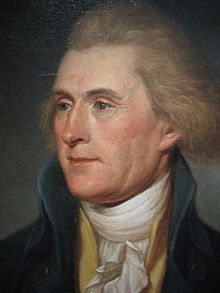
portrait by Charles Willson Peale, 1791
Not a foot of land shall be taken from the Indian without his consent.
Third President of the United States: author, architect,
lawyer, inventor.
As the
historian Leonard Levy observed, no Founder was more prepared to
cast off the protections in the Bill of Rights, or to shed the
blood of his countrymen and to spare his own, or to eliminate from
the earth anyone who did not bind himself to Jefferson's morally
ambiguous paradoxical vision of liberty.
Historian
Anthony Wallace places the Prince of Monticello in an even more
paradoxical light. "He peers down at us from a cliff in the
Black Hills, our own version of the universal Trickster, that
morally ambiguous mythic being who steals fire from gods and brings
the arts, sciences, and social institutions to the world."
But on the dark side, and just as Alexander Hamilton had predicted
years before Jefferson became president, his own record of deeds
would eventually betray his record of words.
As the
nation's foremost champion of individual liberty, Jefferson was the
first to trample on the civil liberties of those who disagreed with
him. Moreover, he was always quick to justify his actions by
declarations of virtuous and benevolent intentions. Despite
his protests to the contrary, Jefferson sought power and exercised
it forcefully, always in the name of the liberty of the people, so
long as 'the people" did not include political apostates or people
of color. As the peerless 'removal era' historian, Anne
Heloise Able concluded, it was the champion of liberty from
Monticello who became the original planner of cultural genocide of
the American Indian, the architect of removal policy, and the
surveyor of the Trail of Tears. Jefferson, who plagerized
John Locke'sSecond Treatise on Governmentin writing the Declaration
of Independence, remains a towering enigma in the American
narrative.
Click here for more on Thomas Jefferson
Related People
Related Events
Related Flashpoints
Related Places